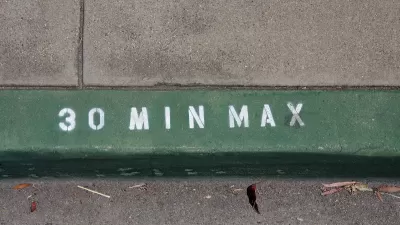What's causing underground parking spaces to go for $160,000 in Beijing? Quartz reports that demand, narrow roads, resident disenfranchisement and old zoning law give developers the upper-hand.
Gwynn Guilford writes of $100,000 parking spaces commonly found in Beijing. Underground parking contributes to China’s real estate speculation, led by “greedy property developers” and growing demand for automobiles. The article stresses that two variables account for why Beijing has some of the world’s most expensive parking spaces: growing car ownership and lack of proper legal knowledge and enforcement means residents pay exorbitant rates—perhaps on parcels they already own.
Thee real backstory here, according to Guilford, is that: “Zoning plans haven’t kept up with Beijing’s embrace of car culture; many slightly older developments were designed without allotting ample parking spaces," and on-street parking is rarely permitted.
The issue is more nuanced: “Beijing has among the lowest ratio of roads per overall land area of any major metropolis in the world…“ and with a population of 7.5 million cars—or a car for every 2.5 residents—private parking is prioritized. While the government vows to reduce a million cars by toying with the license plate lottery, that impending policy has created a "car buying surge" and with it, a "parking spot bubble" in real estate. Values even 30 miles from Beijing’s core cost more than the car itself.
Guilford details further Chinese property laws and elaborates on why residents are willing to pay inflated rents. This, she writes, is due to lack of knowledge about property law or the legal channels to enforce the law, meaning that developers contribute to the scarcity and exact skyrocketing prices “…for a parking space that [residents] legally own.”
FULL STORY: Parking in some areas of Beijing now costs more than $160,000

Alabama: Trump Terminates Settlements for Black Communities Harmed By Raw Sewage
Trump deemed the landmark civil rights agreement “illegal DEI and environmental justice policy.”

Planetizen Federal Action Tracker
A weekly monitor of how Trump’s orders and actions are impacting planners and planning in America.

The 120 Year Old Tiny Home Villages That Sheltered San Francisco’s Earthquake Refugees
More than a century ago, San Francisco mobilized to house thousands of residents displaced by the 1906 earthquake. Could their strategy offer a model for the present?

In Both Crashes and Crime, Public Transportation is Far Safer than Driving
Contrary to popular assumptions, public transportation has far lower crash and crime rates than automobile travel. For safer communities, improve and encourage transit travel.

Report: Zoning Reforms Should Complement Nashville’s Ambitious Transit Plan
Without reform, restrictive zoning codes will limit the impact of the city’s planned transit expansion and could exclude some of the residents who depend on transit the most.

Judge Orders Release of Frozen IRA, IIJA Funding
The decision is a victory for environmental groups who charged that freezing funds for critical infrastructure and disaster response programs caused “real and irreparable harm” to communities.
Urban Design for Planners 1: Software Tools
This six-course series explores essential urban design concepts using open source software and equips planners with the tools they need to participate fully in the urban design process.
Planning for Universal Design
Learn the tools for implementing Universal Design in planning regulations.
Clanton & Associates, Inc.
Jessamine County Fiscal Court
Institute for Housing and Urban Development Studies (IHS)
City of Grandview
Harvard GSD Executive Education
Toledo-Lucas County Plan Commissions
Salt Lake City
NYU Wagner Graduate School of Public Service




























